Authentic Greek Barley Rusks – Paximadi Kritiko
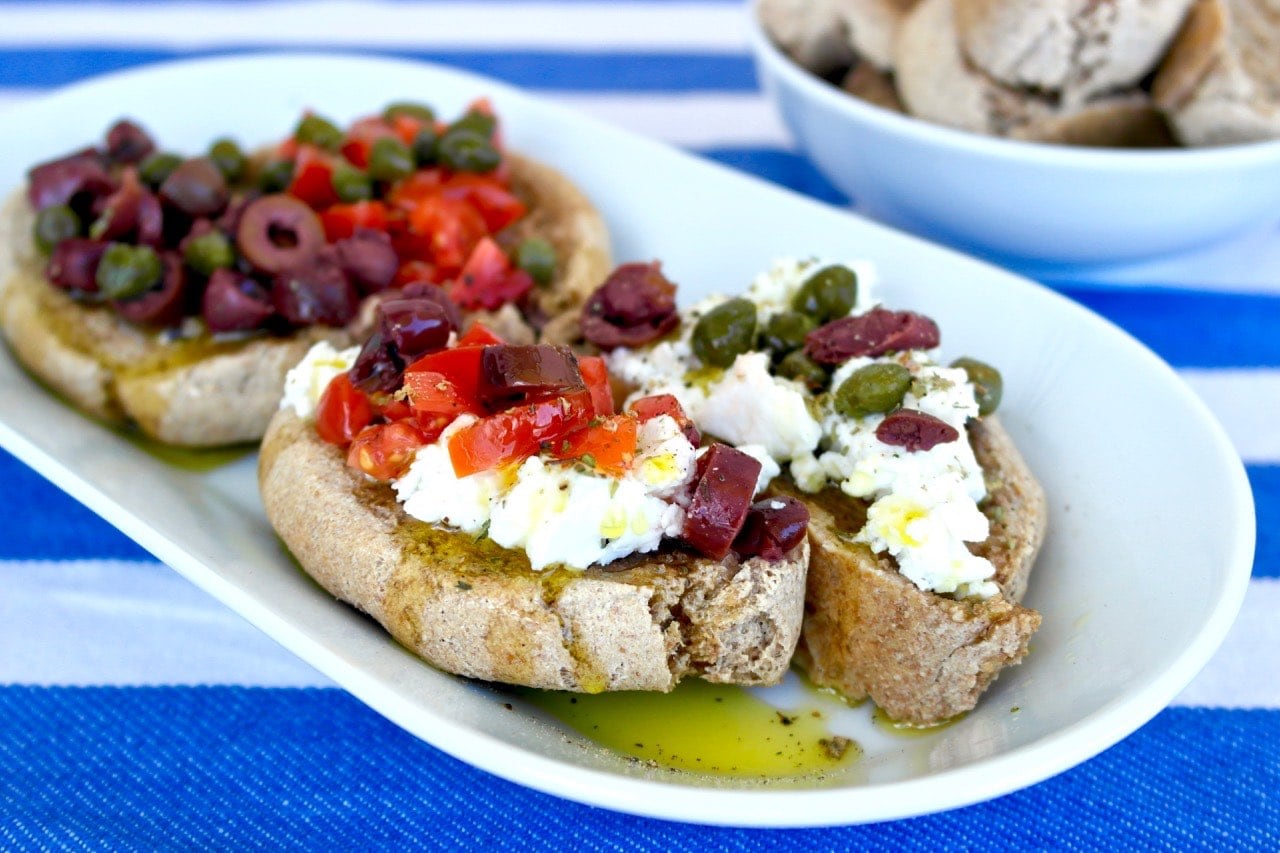
Finally, here is the recipe so many of you have been asking for! Authentic Greek Barley rusks. Not very easy to find outside of Greece, but so delicious and hearty! This Barley rusk is actually a Cretan rusk and is essentially double baked bread that is made with barley flour and sometimes a whole wheat flour. Making rusks was practiced in families that could not bake bread very often so they made these rusks. In addition rusks lasted a long time and traveled well. Barley flour was often used because it was more filling, which was necessary in those lean times.
This type of rusk is present everywhere in Cretan cuisine which is known to be the prototype of the Mediterranean diet. It is either round shaped like a bagel and is called a kouloura or cut in thick slices and is called a dakos. It is slightly soaked in water and drizzled with olive oil and then consumed with cheese or tomato or olives, sometimes just olive oil and oregano. Its most famous use is the Cretan Dakos which is a barley rusk drizzled with olive oil and topped with grated tomato, fresh cheese, olives and sometimes capers. I call it a Cretan salad.
These rusks are a staple in our home. I often eat them as a snack or breakfast using any topping on hand, sometimes I break them and add them to salads and soups like croutons. Most often we use them in the place of bread for dipping in the sauces and olive oil of the various vegetable casseroles. We love the crunchy texture.
Rusk Nutrition
Rusks -called paximadia in Greek- are made in all parts of Greece, and what makes the Cretan rusks unique is the fact that they are made with whole grain barley flour, this makes them extremely healthy. Due to the fiber these rusks provide a feeling of satiety, barley flour also contains beta-glucan, a fiber that is known to be effective in reducing cholesterol levels as well as having prebiotic activity which helps increase good bacteria in our digestive system.
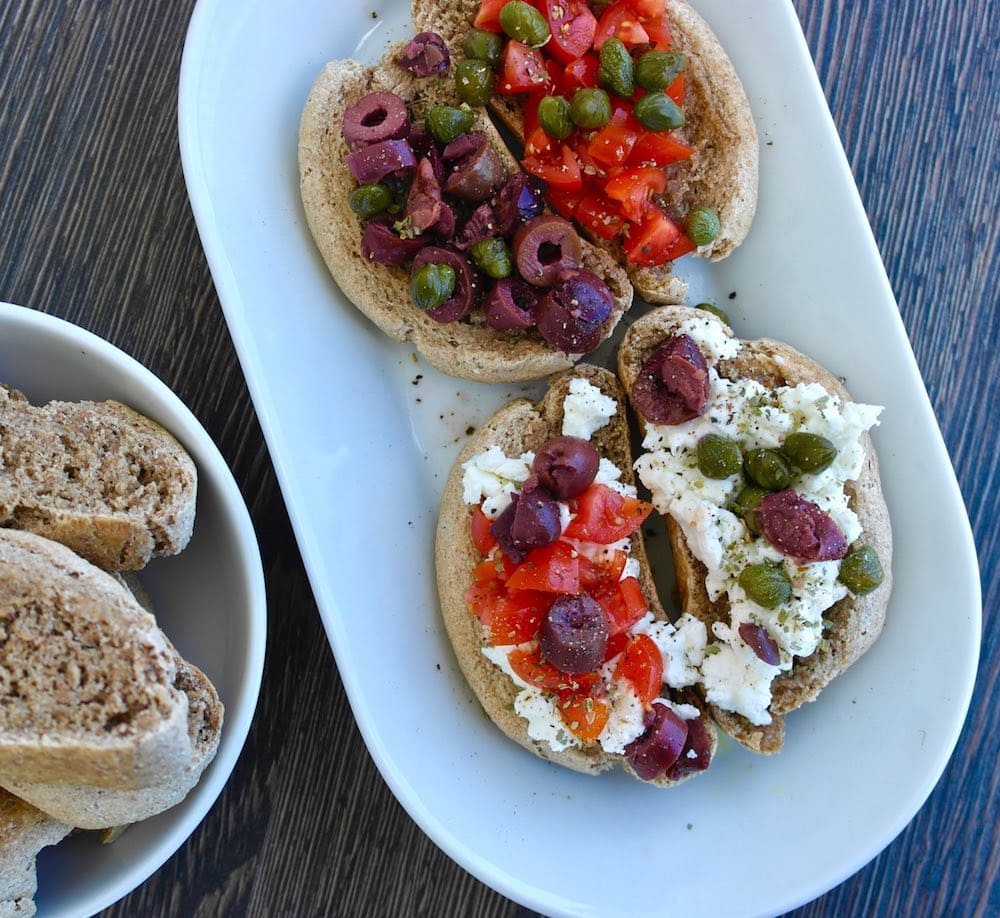
These particular rusks are 100% whole grain and so they can be somewhat tough and hard, that’s why it is important to pass them under some water (just a few drops) so that they can soften a bit, but still have a crunch. There are a variety of ratios of different flours to be used, I wanted the 100% whole grain version, so I only used whole grain flours and used a 50/50 ratio (barley/wheat). You can play with ratios. Generally more barley flour will result in a darker rusk. Also, this recipe requires a bit of kneading, I used my hands (instead of a mixer) and I have to say after a while, I found the kneading to be surprisingly calming.
Luckily in Greece we have plenty of traditional rusks available at bakeries and markets and if you are in Greece I recommend buying a bunch of bags to take home as they have a very long shelf life, but if you are not visiting Greece anytime soon, then here is the recipe, I very much enjoyed making them!
Authentic Greek Barley Rusks – Paximadi Kritiko
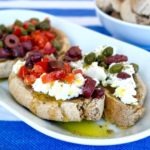
Ingredients
- 25 grams 0.8 ounces fresh yeast (2 ½ teaspoons dry yeast)
- a pinch of salt plus ½ teaspoon for the dough
- ½ pound whole grain barley flour
- ½ pound whole grain wheat flour
- ½ teaspoon sugar
- About 1 ½ cup lukewarm water
Instructions
- In a large measuring cup or bowl we place the yeast (you can break it up) about a half cup lukewarm water (not hot) and a pinch of sugar and mix. Let it sit for about 10 minutes when it starts bubbling on the surface. If you are using dry yeast follow the manufacture’s directions.
- In a large bowl, mix the flour, 1/2 teaspoon salt and the sugar.
- Once the yeast mixture has bubbled, make a whole in the middle of the flour mixture and add the yeast mixture, than add 1 1/2 cup water and start kneading until you have soft (not thick dough) that does not stick to your fingers- I kneaded for about 10 minutes. If you are using a mixer, use the dough hook and mix on low speed until dough is soft and does not stick to the sides of the bowl. If dough is too dry add gradually a bit more lukewarm water.
- Shape into a ball and place in a greased bowl. Cover and let it sit in a warm place until it raises (about an hour).
- Once the dough has risen, knock back the dough and shape it in a long loaf about 1 1/2 inches (3 cm) wide. Cut (not all the way through) in slices and cover the dough and let it rise again.
- Preheat the oven at 350 F (180 C).
- Now bake the loaf for about 1 hour.
- Remove from the oven and lower temperature of oven to 210 F (100 C).
- Once the dough has cooled just enough handle it, separate the slices (I used a knife to do this) and spread them on a pan.
- Bake for 2 hours until completely dry.
- Let them cool completely and store on airproof container
Photos by Elena Paravantes © All Rights Reserved

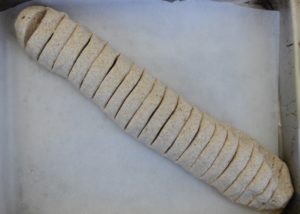
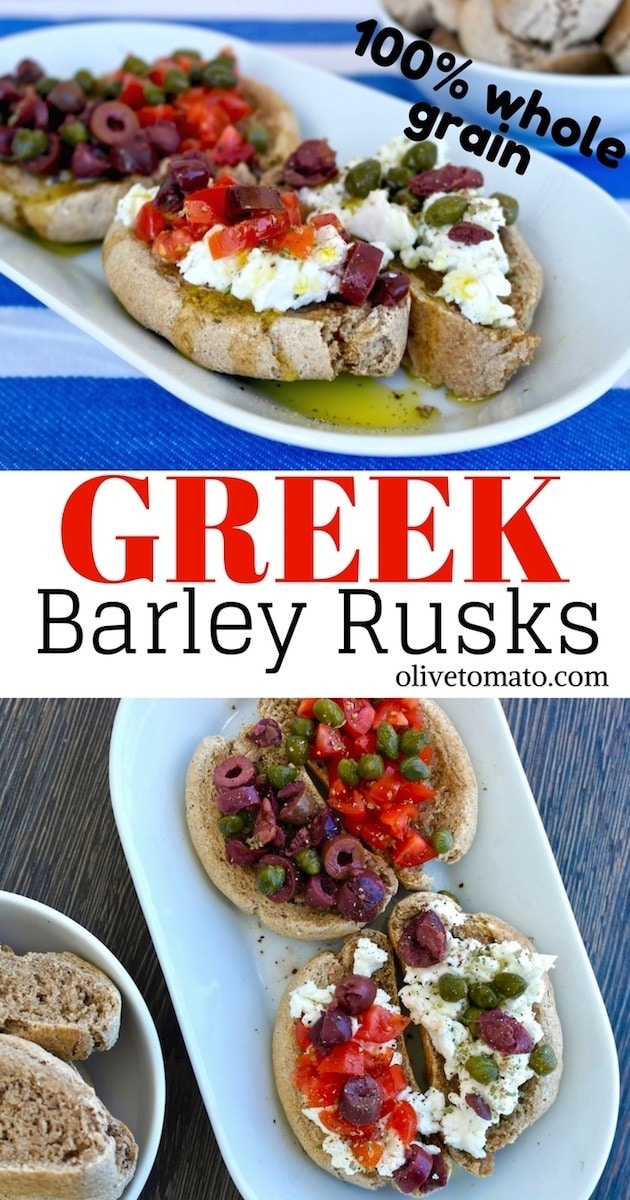
Can you suggest anything that might substitute for authentic Greek rusks? I was wondering about the Food for Life Ezekiel brand English muffins. I use their bread which has a very rough texture and is pretty firm when toasted, but I think it is too thin to use like a rusk. It seems like an English muffin might be about the right size.
Over the years, I have made a lot of bread, by hand and using a machine. I basically suck at bread making. I probably could dry out an English muffin in the oven!
I finally found barley flour in Switzerland and made these yesterday. I enjoyed a lunch of one topped with feta, olives, sardines, and olive oil! Thank you for the recipe and the advice to pass underwater; otherwise, I might have lost a tooth. Very filling with great whole-grain flavor!
Thank you Dorothy! Yes, a bit of soaking is necessary. If you make them with chopped tomatoes you can let the rusks soak in the juice of the tomatoes too.
I’m somewhat interested in making these due to being whole grain, but I’m a little confused by these in theory. Is the consistency like biscotti? The apparent hardness of these don’t sound appealing to me. But then if you add water and they become soggy and mushy, that doesn’t sound appealing either. Soggy bread? Please help me better understand. I’m trying to transition to this diet and have liked many of the recipes. Thanks!
Hi Mary Ann,
The consistency is not like biscotti, they do not get soggy when they get wet because it is a twice-baked bread. When they get wet they are crunchy. Think of them as how a crouton is when it gets wet.
My hubby is from Crete and my daughter is a vegetarian and a nutritional scientist and is just finishing her masters so we all love the Cretan diet especially daco. My question is:- is the 180c fan forced or not. Thank you.
Hi Beris, No fan
Hello. I’m very interested in trying a recipe for a rusk, but I am gluten intolerant. Have you heard of or explored making a rusk with GF flours?
I just made the rusks today, I love Cretan Rusks (Paximadia) but I can never find them in the small W.Texan city I live. I followed your recipe except, I used 1 1/4 c. warm water and 1/4 c. olive oil. It was easy and it made exactly 20 pieces. Delicious and I’m so happy I can finally enjoy rusks with so many things I eat, Greek salad, olives, feta cheese, humus. Thank you so much for your recipe! Now that I found your website I will be trying a lot more of your recipes. Naste kala!
Thank you for sharing Dora! Happy you enjoyed them!
I finally made these today. They turned out great. To tell you the truth I wasn’t expecting to like them with barley flour. I am glad I tried the recipe. It’s a keeper. It’s an easy recipe too. I only needed a total 1.5 C of water. I left 1/4 of the slices out while the rest slow cooked the 2nd time. both ways are good. Thank you for the recipe.
Hi,
Looks delicious! Do you know if these could be made with sourdough starter instead of the dry yeast? If so, how much would you use?
I plan on making these myself soon, but in the meantime I just ordered some from Titan Foods and I’m excited to try them! I also ordered Greek coffee, figs, EVOO, and Macedonian tahini with honey.
Thank you!
Elena, what is the best way to moisten them? Should I mist them with water or brush it on? Or just top with a watery topping? I bought some at a Greek place near us and am not sure just how to prepare them.
Hi Lois, I pass them quickly under running water and then I brush or spray a bit of olive oil on them. I may also sprinkle some dry herbs. Than you can top them with tomato and cheese. After a few minutes the should break easily and fall apart when you bite them, they should be soggy or mushy, but should still be crunchy.
I found them finally Elena … I had to drive a long way on the weekend to get them. Now that I have eaten them I will definitely be using the recipe to make them. I’ve just got to be patient and wait for my barley flour to arrive in the post.
Thanks so much for the recipe. After this, the next thing I will tackle will be the pita bread … every one I have checked is full of preservatives!
Wonderful Mary! Glad you found them!
Hi Elena,
I have been reading about the Greek rusks on your site and bought rusks from a Greek company in Australia. On receiving them, I noticed they were made with wheat flour, thiamine, water, yeast, salt sugar, extra v virgin olive oil, bread improver and vitamin E oil (order of ingredients listed on the pack).
Are these still ok (healthy) to eat?
Thanks Elena.
Hi Mary, What you want in a rusk is to make sure there is either whole grain flour and/or barley flour.
What is 1/2 a pound in CUPS? My dry ingredient ratio states 1/2 pound is 1 cup (80z) I tried with the 2 cups flour and the dough is VERY sticky….help please
Yes, that is right. If it is too sticky you can add more flour.
1/2 pound is, 1 and 3/4 cups
So for this recipe you will use 1 cup and 3/4 cups whole wheat flour an 1 3/4 cups barley flour.
It turns out perfect with the 1 1/2 cups warm water.
I would love to make these! I have a question … I can eat any kind of cooked tomatoes, but fresh tomatoes are a no-go for me. I have tried and tried and tried … I just can’t get them down. So if I wanted to eat these with olive oil and feta, like you suggested, is there something I could substitute for the tomatoes?
Hi Ginger, You can add several other vegetables such as peppers, cucumbers, leafy greens (I like arugula), also olive and capers.